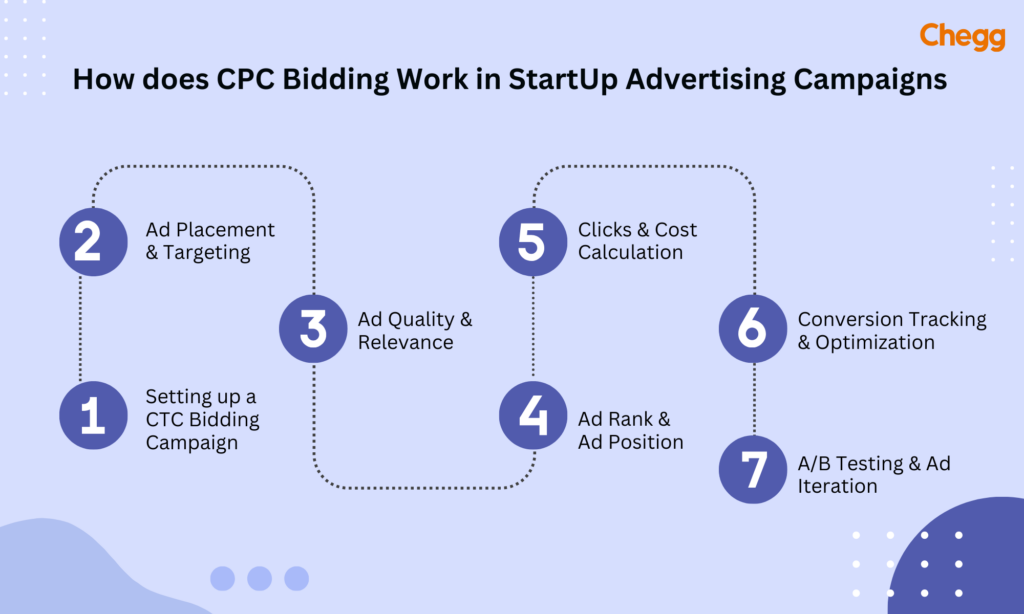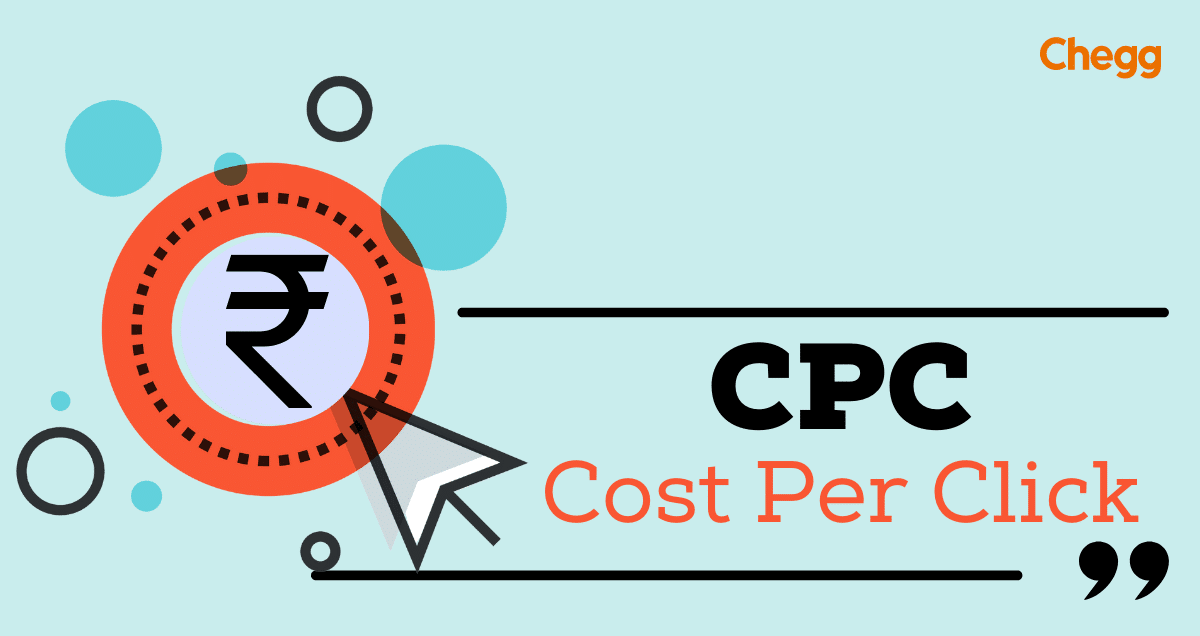Table of Contents
CPC full form

CPC full form is “Cost Per Click,” a pillar of online marketing. When someone clicks on an advertisement, an advertiser is charged a certain amount. Over time, CPC has developed into one of the key measures used to assess the effectiveness of digital advertising campaigns. Advertisers can maximize their return on investment (ROI) and earn revenue by making informed choices by grasping the concept and CPC calculation.
How CPC work?
Many online advertising platforms use the CPC model, including search engines and social media networks. Advertisers place bids on keywords or target demographics, and the relevance and amount of the bids determine which ads are seen. The advertiser is charged a predetermined fee per click each time a user clicks on the advertisement. The technique ensures that advertisers only make payments when users interact with their advertising.

Factors Influencing CPC Rates and Bid Strategies
The factors that influence CPC rates and bid strategies are:
- Keyword competitiveness
- Ad Quality
- Targeting options
- Industry competition
- Effective bid strategies for CPC optimization
- Finding the right balance between bid amounts and ad placement.
- Considering factors such as budget constraints and campaign objectives.
Benefits of CPC Advertising
Targeted and measurable advertising results
The targeted nature of CPC advertising is one of its key benefits. Advertisers might choose certain keywords, demographics, or interests to ensure the intended audience sees their ads. Additionally, CPC makes it possible to measure advertising effects precisely. Advertisers can assess their cost per acquisition (CPA) or return on ad spend (ROAS) by tracking the number of clicks, impressions, and conversions.
Control over advertising budget and cost efficiency
Advertisers have control over their advertising expenditures thanks to CPC. They can set a maximum CPC bid and designate a specified budget because they only pay when a user clicks on their advertisement. This cost control allows advertisers to optimize their spending and deploy resources effectively.
CPC in Online Advertising Platforms
Application of CPC in search engine advertising
Platforms for advertising on search engines, such as Google Ads, mainly rely on the CPC model. Advertisers place bids on suitable keywords, and when people search for those terms, their advertisements are shown. Google’s algorithm considers several variables, including ad quality and the bid amount, to decide where to position ads. Businesses can reach a focused audience actively looking for their goods or services by using CPC in search engine advertising.
CPC in social media advertising
The CPC full form is Cost Per Click, and this model is used by social media platforms such as Facebook Ads, Instagram Ads, and many more. To display their adverts to consumers who are likely to be interested, advertisers might target particular demographics, interests, or behaviors. With CPC, advertisers can ensure that they only pay for genuine engagement, such as clicks, likes, or shares, in their social media ads. This strategy aids companies in boosting brand recognition and generating traffic for their landing pages or websites.
Importance of CPC in measuring advertising effectiveness and ROI
CPC is an important indicator in determining how effective online marketing initiatives are. Advertisers can evaluate the effectiveness of their adverts by monitoring CPC indicators like click-through rates (CTR) and conversion rates. With the help of these insights, they can boost their campaigns, sharpen their strategy, and increase their return on investment (ROI).
CPC Optimization Strategies
Effective keyword research and selection for CPC campaigns
An important stage in optimizing CPC campaigns is keyword research. Advertisers must find appropriate keywords related to their goods or services with a suitable search volume. The visibility of an advertiser’s ad to the intended audience and the likelihood that their ad will be clicked on can be improved by choosing the appropriate keywords. Negative keyword usage can also aid in targeted refinement and avoid pointless clicks, enhancing the campaign’s effectiveness.
Techniques for improving click-through rates (CTR) and conversion rates
Advertisers should increase both click-through rates (CTR) and conversion rates to improve CPC advertisements. By persuading people to click on the advertisements, compelling ad copy, appropriate landing pages, and obvious calls to action can raise the CTR. Additionally, shortening the checkout process or providing incentives can increase conversion rates when optimizing landing pages for conversions.
CPC and Ad Performance Tracking
Tools and metrics for monitoring and analyzing CPC campaigns
To track and evaluate CPC campaigns, a variety of tools and indicators are available. Online advertising systems frequently offer integrated analytics dashboards, providing information on crucial metrics, including impressions, clicks, CTRs, and conversions. Furthermore, third-party tracking systems can offer more thorough information, helping advertisers follow a customer’s path from ad click to conversion. Advertisers may optimize their CPC campaigns by regularly monitoring these indicators to discover patterns, identify potential areas for improvement, and make data-driven decisions.
A/B testing and performance optimization based on CPC data
Optimizing CPC campaigns can be done by using A/B testing. Advertisers can simultaneously test several versions of their advertising, landing sites, and call-to-action buttons. Advertisers can determine which factors produce better results and decide on their campaign improvements by comparing the performance of various variations. A/B testing enables advertisers to continuously improve their CPC ads, maximizing their efficacy and return on investment.
Challenges and Considerations in CPC Advertising
Competition and bid management in highly competitive markets
Due to increasing competition among businesses in highly competitive markets, CPC rates can be considerably higher. Advertisers must establish efficient bid management systems for their advertising to remain competitive while maintaining a fair cost per click. To get around this problem, advertisers should concentrate on long-tail keywords, use ad scheduling to target specific times, or look into alternate advertising platforms with less competition.
Fraud prevention and click quality assurance in CPC campaigns
Click fraud, which consists of fictitious or malicious clicks meant to drain an advertiser’s budget without producing real engagement, can affect CPC campaigns adversely. Advertisers must implement fraud prevention measures, such as monitoring suspicious activity and deploying click fraud detection technologies. Reviewing CPC statistics frequently and checking click quality will help you spot any irregularities and take the appropriate precautions to safeguard the campaign’s budget and integrity.
Alternatives of Cost Per Click
A few of the many options available to replace Google AdSense are Media.net, Infolinks, Amazon Advertising, and Bidvertiser. Some focus on small or large publishers, and to remain competitive, some provide a better offer than Google AdSense. With Amazon Advertising, affiliates can run ads that target customers both on and off the website when they search for particular products. Advertisers can run campaigns on Facebook and Instagram using Meta Ads Manager.
Conclusion
CPC full form is Cost Per Click, an essential component of internet advertising and a key factor in generating income. Advertisers can increase brand awareness, attract targeted website traffic, and boost conversion rates by grasping the notion of CPC and implementing effective methods. Advertisers can maximize their ROI and get the most out of their advertising spending with careful tracking and adjustment.
| LPG full form | |
| LIC full form | SDM full form |
| SUV full form | RSA full form |
| PFMS full form | IMDB full form |
| SC full form | PRO full form |
CPC Full Form: FAQs
What is CPC full form?
It is Cost Per Click, or the price advertisers charge for each ad click.
How can my CPC be decreased?
Comprehensive keyword research, increased ad quality, honed targeting, enhanced landing pages, and monitored and modified bids following performance statistics.
What is CPC for digital marketing?
With cost-per-click (CPC full form) bidding, you are charged a fee for each ad click. The maximum amount you are willing to pay for a click on your advertisement is known as your “max. CPC” in CPC bidding campaigns (unless you are using Enhanced CPC or setting bid adjustments).
Is click fraud an issue with CPC marketing?
Yes, but it can be reduced with monitoring, safety precautions, and click fraud detection technologies.
Can CPC prices differ between platforms?
The popularity of the platform, the level of competition, the targeting possibilities, and the caliber of the ads can all affect CPC rates.
How can I monitor the success of a CPC campaign?
Use built-in analytics, third-party tracking solutions, and conversion tracking to track impressions, clicks, CTRs, conversions, and other metrics.
Got a question on this topic?
